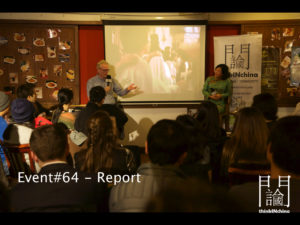

SPEAKERS
Ian JOHNSON, Pulitzer-Prize winning journalist, writing for the New York Times, The New York Review of Books, the New Yorker
CHEN Xia 陈霞, Research Fellow, Institute of Philosophy, Chinese Academy of Social Sciences
As we gathered for our December event at The Bridge, the theme for it was the recent spiritual (re)awakening in China. From the first time Ian Johnson came to China in the 1980s until today, he noticed the changing landscape regarding how Chinese people related to temples, praying and religion in general. In the 1980s, temples in China were abandoned, destroyed, or used for different purposes. “The Souls of China”, through covering five religious groups in China, discusses the return of cultural and religious practices in the country in the 21st century. In search for moral guidance, new religious groups have been appearing. The process happened spontaneously, with people starting to donate and contribute to the rebuilding of temples.
Although the perception at first was that it was part of the relation between communism and religion, the disappearing of religious life started with the intellectual elite during the 100 years of humiliation and the movements that led to the republic. It was seen as necessary to go after the role of the political influence of religion, especially in rural villages, in order to find modernization. It continued under the Kuomintang, as some religious habits were allowed and others forbidden. Soon, communal activities of spiritual Chinese life – folk culture – became “superstition”. The Cultural Revolution was the final blow in a long process of shutting down the role of religion in China. Only in 1982, it would return to be seen as a positive cultural heritage.
The return of spiritualism that surged in China now is also part of a movement that happened around the world, as many societies saw themselves facing a “crisis of modernity”. Triggered by a feeling of spiritual vacuum (what are the ideas that hold us together as a society?) and encouraged through social media interaction, a national debate started over values and morality. The groups all unite in search of a sense of community that seemed to have been lost in many of Chinese largest cities, particularly for migrants.
Chen Xia emphasized the dramatic changes of the last twenty years, particularly in the academia – where religious studies was largely non-existent. She also emphasized how religion has helped with the transitions and transformation of Chinese society. Johnson later added how religion has been helping to explain how to respond to certain situations and guide attitudes. Later on, Chen added how Confucianism has been central to discussing heaven and behavior, but when China became a nation-state, it has been difficult to transition those habits to legislation. Thus, today and for the future of Chinese society, it is necessary also to engage Confucianism and written laws in a conversation.
The Chinese government hasn’t been ignoring this, and thus, abandoned the discourse of superstition, embracing these practices and offering subsidies to cover basic costs of religious groups. During the Q&A, Chen emphasized how the government has worked along with religious communities to create a cooperation between religion and socialism – in the hopes of building a more harmonious society.. Although concern was raised over the role of government administration and management over these religions, they are allowed to exist and practice – as long as they support the leadership of the CCP.
However, Johnson pointed out that the main concern of the people involved in these religious associations is how to both honor the past and pass it down to the next generation. It was also raised as an important point of the Chinese identity and modern discussions on this issue. Some younger Chinese attendees reaffirmed how religion was very interesting, but they didn’t feel very connected in a personal level – although didn’t consider it so far from their lives. It is part of the connection between the culture of ancient China and thus, it builds a bridge with older generations.
Report written by Julia Rosa